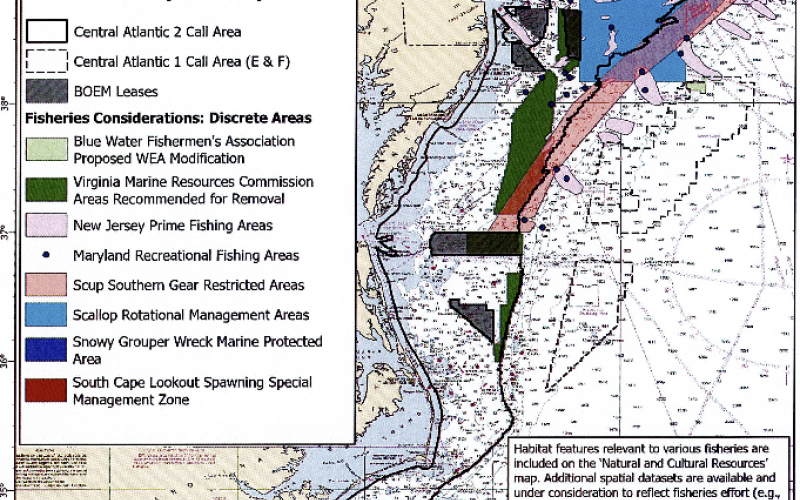The newly proposed Central Atlantic wind energy area “unnecessarily includes some of the most critically important scallop fishing areas on the East Coast” – even as the Bureau of Offshore Energy Management has ample data to avoid the conflict, New Bedford port officials wrote in a scathing Oct. 21 comment letter to the agency.
BOEM has “all the technical and scientific detail necessary to understand how essential the Elephant Trunk, Hudson Canyon, and Delmarva areas are to the scallop industry,” wrote Gordon Carr, executive director of the New Bedford Port Authority. “What is stunning to us is that all that data is and was available to BOEM prior to setting the boundaries of the proposed call area.”
New Bedford is the most profitable U.S. fishing port – mostly on the strength of the sea scallop fishery – and the nation’s first big “offshore wind industrial marshalling port,” Carr noted.
Port advocates have been “diligent in providing comments for multiple offshore wind projects underway and proposed for the future,” Carr added. “However, we have become more and more concerned that development must only be accomplished in a responsible manner by protecting established industries that share our waters.”
That must “include learning from mistakes made in failing to avoid and address the interaction and conflicts between offshore wind and commercial fishing” already, and avoiding more conflicts early in BOEMs’s planning, the letter says.
In drawing the Central Atlantic call area, excluding scallop grounds “would have left the vast majority of the more than 13 million acres and have virtually no effect on the overall area potentially available for future leases,” according to the letter. Setting the call area’s northern boundary 150 miles to the south would still leave 400 miles and millions of acres to South Carolina available for future wind projects, it says.
The letter echoes longstanding, insistent complaints in the commercial fishing industry that BOEM’s planning process fails to head off user conflicts. Wind power supporters can point to cases where fishing advocates have made some headway – such as excluding productive shrimp fishing areas from Gulf of Mexico wind planning.
BOEM officials have said the Gulf of Mexico process showed a path forward by including concerns over fishing, shipping and wildlife. But the early stages of the Central Atlantic 2 area renewed alarms among Northeast and Mid-Atlantic fishermen.
The New Bedford officials’ letter speculates “a cynical interpretation” could be that BOEM included the scallop grounds only to reduce the call area and declare it is addressing the conflict.
“Such an approach invites rancor and frustration from the commercial fishing industry, an outcome which is counterproductive to advancing the responsible development of offshore wind,” the letter warns. “It also risks diluting the credibility of BOEM as an agency that claims to have heard the concerns expressed in the past.”
Port officials also critiqued BOEM’s stated strategy of “avoidance, minimization, and mitigation” to address impacts on other ocean users. The agency has only made “a minimal effort at mitigating or addressing the interaction or potential interaction between offshore wind and commercial fishing since 2011,” they contend.
Recent BOEM documents appear to “take the position that financial mitigation payments to commercial fishermen are an acceptable or satisfactory form of mitigation for the impact of offshore wind,” according to the letter.
“Reliance on financial compensation as a primary form of fisheries mitigation is a dangerous practice for fishermen and the communities they support. It damages shoreside businesses, reduces the likelihood of new generations entering the business, and devalues fisheries permits.”




